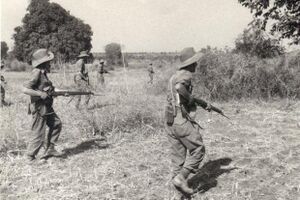Battle of Mazahr-Sharif
This article is incomplete because it is pending further input from participants, or it is a work-in-progress by one author. Please comment on this article's talk page to share your input, comments and questions. Note: To contribute to this article, you may need to seek help from the author(s) of this page. |
The Battle of Mazahr-Sharif (5 September - 15 October 1942) was a battle involving led elements of the Taoyuanese Free Corps against the combined elements of Quenminese and East Europan forces. The battle took place following the Quenminese victory at the Battle of Adibotara Crater, in which following the eponymous battle, Imperial forces under Marshal Mạc Hiếu Quang planned a mass pincer movement by moving mechanised divisions to the north regions of Afghania then sweeping southwest towards the Elyagan Valley that would trap the entire Allied forces. Many commanders saw this as an ambitious feat to trap Sugiyama's 650,000-strong army.
The first movements came as early following the Imperial victory during the Pakistania Campaign in late August 1942. RAF reconnaissance units reported a large movement of Imperial forces heading for Mazahr-Sharif. Sugiyama understood what the strategy meant and immediately mobilised available units to the north. However, Taoyuanese forces were the only ones available that were the closest to the city. Sugiyama immediately ordered General Song Li-jen to attempt to halt Imperial forces at the the town of Mazahr-Sharif. By September 5, Taoyuanese forces arrived at the town and immediately engaged with Imperial forces securing the city. Wanting to have the mass encirclement take place immediately, General Kiều Dũng Quang ordered his suboordinate, General Phó Minh Duyên to bypass Taoyuanese forces and continue heading towards the Elyagan Valley while his forces would keep the Taoyuanese at bay. Song saw through this and immediately dispatched the 2nd Taoyuanese Armoured Division to bottle up Duyen's attempted armoured thrust. This forced Quang to change his strategy of attempting to pincer the 50,000-strong Taoyuanese forces in and at the outskirts of the town. To prevent the pincer from taking place, Song immediately committed an offensive towards the northern flank with the intentions of pushing Imperial forces into the town. Taoyuanese forces put up a fierce resistance in the south that enabled Song to push Imperial forces into the town by 21 September. Then in 25 September, Song sent in a brigade to enable the 2nd Armoured Division into Mazahr-Sharif. Song later went to the point of isolating at least 20,000 Imperial troops in order to cripple further Imperial advances. The Imperials sent several relief forces to break Song's encirclement but to no avail. Song had firmly established defenses that could prevent an Imperial relief force from breaking the encirclement, much to Quang's disappointment. In 13 October, ERUAC forces arrived near Mazahr-Sharif in order to force Quang to away from the town and into Kabul. At that time, Marshal Quang was taking on Sugiyama's forces in the Afghanian capital. But Regnitz's thrust proved to be overwhelming that Quang was unable to send his forces to support Quang in Kabul. Cut-off and low on ammunition, the remaining 20,000 Imperial troops in Mazahr-Sharif surrendered.
The Allied success in Mazahr-Sharif was the first Allied success since the Marshal Quang's taking over of command from Marshal Thạch Hung Sõn Chiến. It also established Song's identity as one of Taoyuan's best commanders of the war, with this Taoyuanese Free Corps gaining a legendary status in their home country. Song's defenses, coupled with his successful encirclement of Imperial forces allowed Regnitz to plot out Operation Black Spear.
